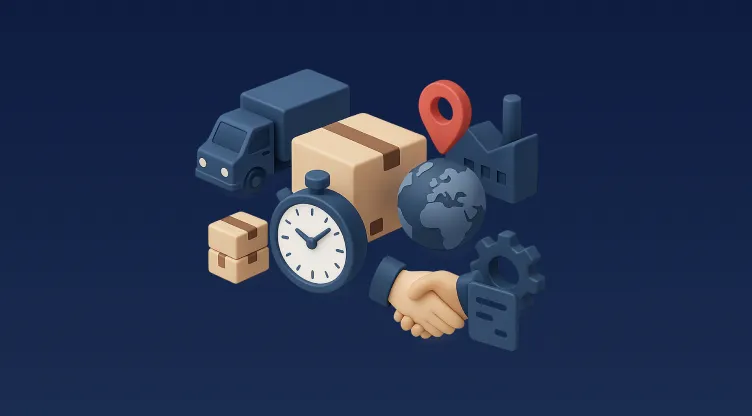Introduction
In today's fast-paced logistics and supply chain landscape, businesses face increasing pressure to deliver goods faster, at lower costs, and with greater visibility. A Transport Management System (TMS) plays a pivotal role in optimizing freight movements, reducing costs, improving efficiency, and ensuring timely deliveries.
Whether you are an eCommerce business, a third-party logistics provider (3PL), a retailer, or an enterprise supply chain manager, implementing a robust TMS can streamline operations and enhance customer satisfaction.
In this article, we’ll cover the basics of a Transport Management System, how it optimizes shipment routing, and the key cost/time-saving benefits it offers.
What is a Transport Management System (TMS)?
A Transport Management System (TMS) is a digital solution that helps businesses plan, execute, and optimize the movement of goods. It integrates with Warehouse Management Systems (WMS), Order Management Systems (OMS), and fulfillment platforms to provide end-to-end logistics automation.
A modern TMS offers:
- Route Optimization: Determines the most efficient delivery paths.
- Real-Time Shipment Tracking: Provides visibility into shipment status.
- Freight Cost Management: Reduces expenses by selecting the best shipping options.
- Carrier Integration: Connects businesses with multiple shipping providers.
- Data Analytics & Reporting: Helps in decision-making by providing shipment insights.
How TMS Optimizes Routing & Shipments
1. Route Optimization for Faster & Cost-Effective Deliveries
One of the primary advantages of a TMS is route optimization. By leveraging AI and machine learning, a TMS analyzes factors such as:
- Traffic conditions
- Weather forecasts
- Distance & road conditions
- Fuel efficiency & carbon footprint
Using this data, a TMS suggests the best routes, ensuring that shipments reach customers quickly and cost-effectively. This is especially valuable for businesses operating in MENA and GCC regions, where long-distance trucking and cross-border logistics are common.
Example:
A retailer using Omniful's TMS can automate last-mile delivery routing, ensuring that customers receive packages in the shortest possible time while minimizing fuel costs.
2. Multi-Carrier Shipping for Cost Savings
A TMS integrates with multiple shipping carriers, allowing businesses to compare freight rates and choose the most cost-effective option.
Benefits:
✅ Dynamic Carrier Selection: TMS selects the best shipping partner based on cost, speed, and reliability.
✅ Automated Carrier Allocation: Businesses can predefine shipping rules to select carriers automatically.
✅ Negotiation Power: With multiple shipping options, businesses can negotiate better freight rates.
Real-World Use Case:
A 3PL provider managing shipments across Saudi Arabia, UAE, and Egypt can use a TMS to select the best carriers for cross-border transportation, optimizing cost and delivery timelines.
3. Real-Time Tracking & Visibility
A TMS offers real-time shipment tracking, providing businesses and customers with live updates on delivery status.
Features:
- Live GPS Tracking: Track delivery vehicles in real-time.
- Geo-Fencing Alerts: Get notified when shipments enter or leave specific areas.
- Automated ETA Updates: Ensure accurate delivery time predictions.
This level of visibility reduces customer inquiries, enhances satisfaction, and helps businesses proactively handle delays.
Example:
An eCommerce brand in Dubai using Omniful’s TMS can offer live order tracking to customers, improving trust and reducing failed deliveries.
4. Freight Cost Reduction & Load Optimization
A TMS significantly reduces freight costs through automated load optimization. Instead of shipping half-empty trucks, businesses can:
✔ Consolidate multiple shipments into a single vehicle.
✔ Optimize truckloads to maximize space utilization.
✔ Reduce empty miles by planning return trips with loaded freight.
Cost-Saving Impact:
- Lower transportation expenses due to reduced fuel consumption.
- Decreased dependency on emergency/expedited shipping.
- Fewer carbon emissions, making operations more sustainable.
Industry Application:
A retail supply chain operating in the GCC region can reduce costs by consolidating shipments into fewer trucks instead of sending out multiple underutilized vehicles.
5. Automated Dispatch & Delivery Management
A TMS automates driver dispatching, reducing manual workload and improving efficiency.
Features:
- Auto-Assigning Deliveries: Assigns shipments to drivers based on availability, proximity, and workload.
- Electronic Proof of Delivery (ePOD): Drivers can capture customer signatures & images as proof of delivery.
- Exception Management: Automatically flags delivery failures and reroutes shipments accordingly.
Benefit:
Businesses save time and manpower by eliminating manual dispatching errors, ensuring faster, smoother deliveries.
TMS Use Cases Across Industries
📦 eCommerce Businesses
Challenge: High shipping costs & unpredictable delivery times.
TMS Solution: Route optimization & multi-carrier shipping to reduce costs and improve delivery speed.
🚚 Third-Party Logistics (3PL)
Challenge: Managing large-scale shipments across multiple locations.
TMS Solution: Centralized shipment tracking, carrier management, and automated dispatch.
🏬 Retailers
Challenge: Poor inventory visibility & last-mile delivery failures.
TMS Solution: Omniful’s TMS integrates with POS & WMS for real-time inventory and optimized deliveries.
🏢 Enterprise Supply Chains
Challenge: Cross-border shipment delays & compliance issues.
TMS Solution: Advanced analytics, customs integration, and freight consolidation for seamless operations.
Choosing the Right Transport Management System
When selecting a TMS for your business, consider the following:
✅ Cloud-Based vs. On-Premise: Cloud-based TMS offers scalability & remote access.
✅ Integration Capabilities: Ensure it connects with your OMS, WMS, ERP, and carrier networks.
✅ Scalability: Choose a TMS that adapts to business growth.
✅ User-Friendly Interface: A simple UI reduces training time & adoption challenges.
✅ Compliance & Security: Ensure the TMS meets regional regulations & data security standards.
Omniful’s TMS provides a comprehensive transport management solution that addresses these needs while offering advanced automation, multi-carrier integration, and real-time shipment tracking.
Conclusion
A Transport Management System (TMS) is a game-changer for businesses seeking to optimize shipments, reduce logistics costs, and improve delivery speed.
By implementing TMS solutions like Omniful’s, businesses across MENA, GCC, and global markets can achieve greater efficiency, automate operations, and enhance customer satisfaction.
🚀 Ready to optimize your transport operations? 👉 Schedule a Demo and see how Omniful’s TMS can transform your logistics.

























